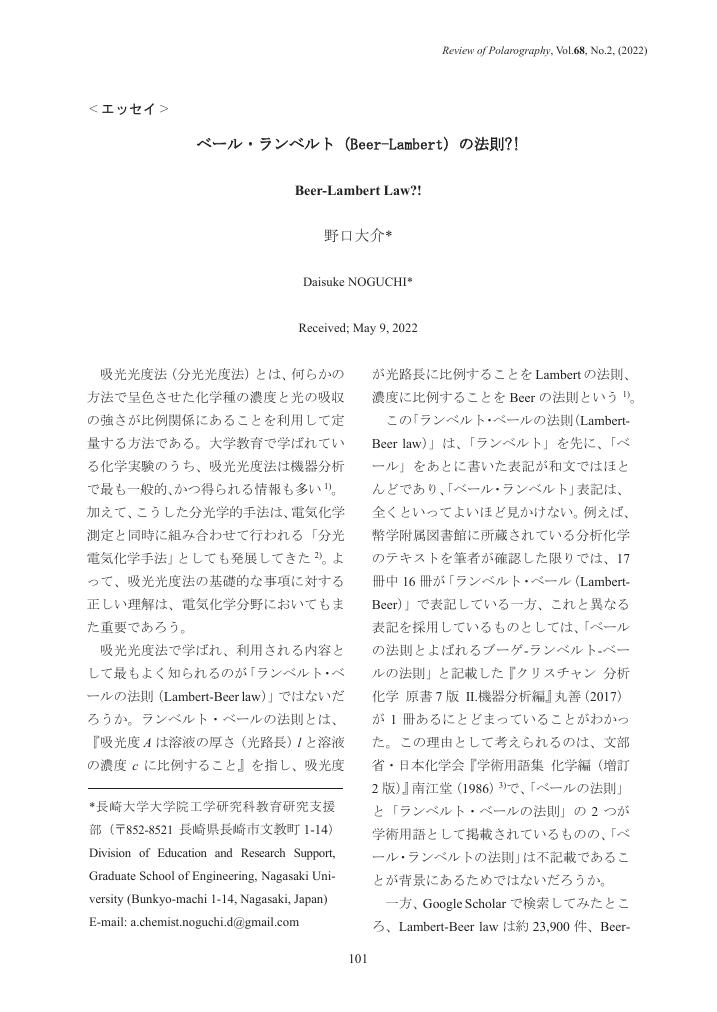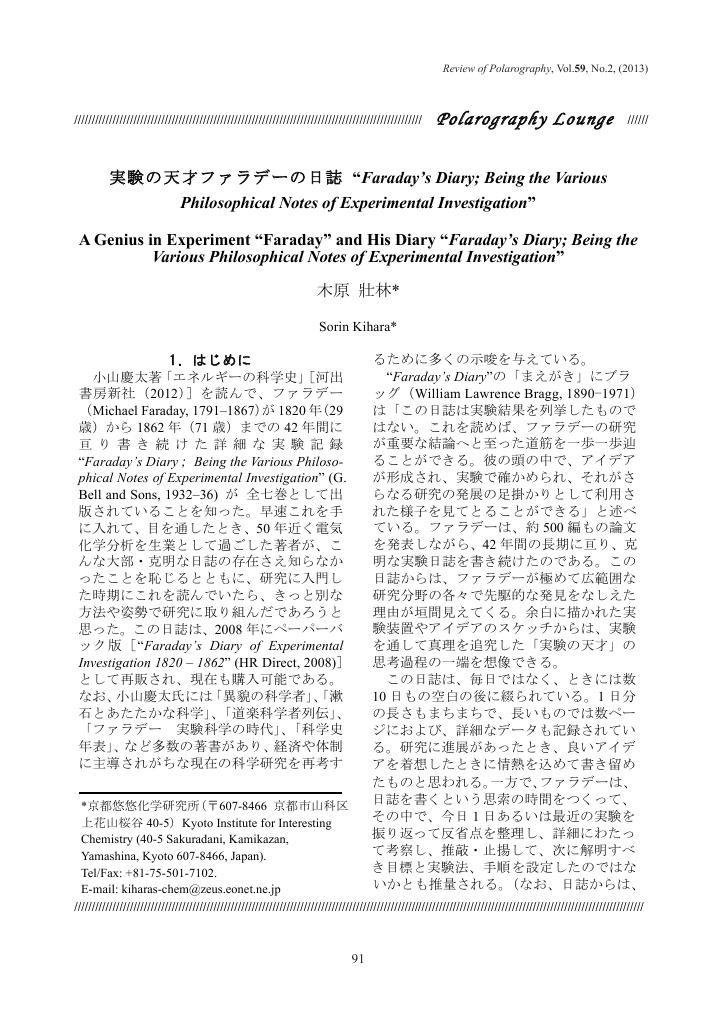64 0 0 0 OA 水とアルコールの化学― 酒類の「熟成」の謎を解き明かす
- 著者
- 北條 正司
- 出版者
- 日本ポーラログラフ学会
- 雑誌
- Review of Polarography (ISSN:00346691)
- 巻号頁・発行日
- vol.50, no.2, pp.125-134, 2004-09-28 (Released:2011-10-21)
- 参考文献数
- 18
11 0 0 0 OA ベール・ランベルト(Beer-Lambert)の法則?!
- 著者
- 野口 大介
- 出版者
- 日本ポーラログラフ学会
- 雑誌
- Review of Polarography (ISSN:00346691)
- 巻号頁・発行日
- vol.68, no.2, pp.101-103, 2022-10-21 (Released:2022-10-19)
- 参考文献数
- 11
11 0 0 0 OA 電気化学を知らない化学者がなぜ多いのだろう
- 著者
- 徳田 耕一
- 出版者
- 日本ポーラログラフ学会
- 雑誌
- Review of Polarography (ISSN:00346691)
- 巻号頁・発行日
- vol.51, no.1, pp.35-40, 2005-05-31 (Released:2010-06-28)
- 参考文献数
- 6
4 0 0 0 OA 電気化学者は見た!
- 著者
- 木原 壯林
- 出版者
- 日本ポーラログラフ学会
- 雑誌
- Review of Polarography (ISSN:00346691)
- 巻号頁・発行日
- vol.60, no.2, pp.121-134, 2014-09-24 (Released:2014-09-27)
3 0 0 0 OA 実験の天才ファラデーの日誌 “Faraday’s Diary; Being the Various Philosophical Notes of Experimental Investigation”
- 著者
- 木原 壯林
- 出版者
- 日本ポーラログラフ学会
- 雑誌
- Review of Polarography (ISSN:00346691)
- 巻号頁・発行日
- vol.59, no.2, pp.91-100, 2013-09-27 (Released:2013-10-09)
- 参考文献数
- 10
2 0 0 0 OA 電気化学者は見た! ―測定法の歴史―(前篇)
- 著者
- 木原 壯林
- 出版者
- 日本ポーラログラフ学会
- 雑誌
- Review of Polarography (ISSN:00346691)
- 巻号頁・発行日
- vol.60, no.1, pp.59-71, 2014-05-21 (Released:2014-05-28)
- 参考文献数
- 6
- 被引用文献数
- 1
2 0 0 0 OA 電気二重層:チュートリアル
- 著者
- 山本 雅博
- 出版者
- 日本ポーラログラフ学会
- 雑誌
- Review of Polarography (ISSN:00346691)
- 巻号頁・発行日
- vol.56, no.1, pp.11-30, 2010-05-31 (Released:2010-06-18)
- 参考文献数
- 11
- 被引用文献数
- 4 5
電気二重層は電極電位を決定するので電気化学において最も基本的な概念であり,スーパーキャパシター等の応用でも重要であるが,電気化学を専門としている学生諸氏の間で電気二重層の理屈はよくわからないとう声を良く聞く。帯電した電極を対(たい)イオンが遮蔽する静電相互作用 (Poisson方程式)とそのイオンが熱的に散らされて分布( Boltzmann分布)することを同時に考慮(非線形微分方程式)しなくてはならないからであろう。従って,電気2重層の理論は,電磁気学と (統計・ )熱力学に基礎を置く。化学系の学生は,電磁気学(より正確にはガウスの法則だけで十分だが)を理解しにくいてことが,よくわからない原因であるようだ。以下その点も考慮して解説した。付録に,ガウスの法則の説明を書いたので,電磁気学の復習も含めてそこから読んで欲しい。 ここでは, Gouyによって定式化された100年の歴史をもつ Gouy(-Chapman理論) [1, 2] 1および Stern[3]による補正をまず述べる。電気二重層の測定結果の解析においては,大抵の場合この GCS(Gouy-Chapman-Stern)理論で説明が(定性的にももちろん定量的にも)可能である。その後, Grahameが GCS理論に特異吸着の効果を入れてこの理論はある意味完成した [4]。この GCSG理論の基本方程式である非線形 Poisson-Boltzmann式を数値的に解くことにより,帯電界面をもつ3次元構造体(たとえばタンパク質)の電気二重層構造が明らかとなった。 その GCSG理論では,溶媒は無構造誘電体で,イオンの大きさ,イオン間の相互作用も考慮されてないので,電極が強く帯電している場合や電解質濃度が高い場合には一般には正しくない。紙面の都合で,その後進展してきた分子シミュレーションによる電気二重層の数値解については改めて述べたい。長距離力であるクーロン相互作用が帯電した界面で正確に考慮されてない分子シミュレーションの結果の取り扱いには慎重さを要することと,実験で得られている微分キャパシタンスの結果を再現したシミュレーションはまだないように思う。電解質水溶液の場合,溶媒分子数に比べて電解質のイオン数が少なく,シミュレーションで集団平均・時間平均をとることが困難であることも原因のひとつである。
2 0 0 0 OA あいまいな電気分析化学
- 著者
- 垣内 隆
- 出版者
- 日本ポーラログラフ学会
- 雑誌
- Review of Polarography (ISSN:00346691)
- 巻号頁・発行日
- vol.60, no.2, pp.99-109, 2014-09-24 (Released:2014-09-27)
- 参考文献数
- 22
- 被引用文献数
- 1 2
The criticism to the concept and use of single ion activity raised by de Levie (2010) has been examined. The lack of falsifiability in the concept of single ion activity, which he claims, led him to categorize the single ion activity as one of non-falsifiables, typified by the emperor’s new clothes (2012). However, his criticism is overeager, because the single ion activity can be estimated with a reasonable certainty, whose degree varies with a nonthermodynamic assumption employed, though. Electrochemistry is intrinsically nonthermodynamic, although in many of electrochemistry textbooks its cell voltage is correlated with the Gibbs energy of a redox reaction that would proceed in a homogeneous solution between the two redox couples, which are employed in the electrochemical cell. Ironically, such oversimplified understanding or picture of the nature of electrochemical cells partly justifies the criticism raised by de Levie. The obscurity associated with nonthermodynamic nature of electrochemical cells translates to the obscure interpretation of the Nernst equation in the form, E = E0 + (RT/F)ln(aOx/aRd), which has long been applied to a working electrode in electroanalytical chemistry. By focusing on this obscurity, it is possible not only to make our understanding of electroanalytical chemistry clearer but to design an electrochemical cell for less obscure, more reliable estimation of single ion activities.
2 0 0 0 OA ラプラス変換の電気化学への応用
- 著者
- 大堺 利行
- 出版者
- 日本ポーラログラフ学会
- 雑誌
- Review of Polarography (ISSN:00346691)
- 巻号頁・発行日
- vol.62, no.2+3, pp.109-114, 2016-10-17 (Released:2016-10-26)
- 参考文献数
- 9
- 被引用文献数
- 1
Laplace transform was first introduced to electrochemistry in 1947 by Koutecký and Brdička, who derived an analytical equation of the polarographic “kinetic current” for weak acids at the dropping mercury electrode. Since then, Laplace transform has been successfully used to solve diffusion problems in a variety of electrochemical measurement systems. This article shows how to apply Laplace transform to obtain an analytical equation of the current–potential curve for a simple redox system. A previous practical application made by the author has also been described.
- 著者
- ポーラログラフ委員会
- 出版者
- 日本ポーラログラフ学会
- 雑誌
- Review of Polarography (ISSN:00346691)
- 巻号頁・発行日
- vol.8, no.3, pp.80-80, 1960 (Released:2010-06-28)
2 0 0 0 川の流れのように : 第42回ヘイロフスキー・ディスカッション
- 著者
- 巽 広輔
- 出版者
- 日本ポーラログラフ学会
- 雑誌
- ポーラログラフィー (ISSN:00346691)
- 巻号頁・発行日
- vol.55, no.2, pp.97-99, 2009-09-28
1 0 0 0 OA カールフィッシャー滴定による水分量測定の原理
- 著者
- 大堺 利行
- 出版者
- 日本ポーラログラフ学会
- 雑誌
- Review of Polarography (ISSN:00346691)
- 巻号頁・発行日
- vol.63, no.2, pp.101-107, 2017-10-10 (Released:2017-10-12)
- 参考文献数
- 13
- 被引用文献数
- 2 2
In 1935, Karl Fischer (KF) proposed a titration method for water content determination. Since then, KF titration has been extensively applied in the determination of water in various samples, including liquids, solids, and gases. The present article describes the reaction mechanism, the two different methods (i.e., volumetry and coulometry), and their instruments and advantages/disadvantages. As an example, an application of KF titration is described in the study of the coextraction of water with hydrophilic ions to water-immiscible organic solvents (e.g., nitrobenzene).
1 0 0 0 OA 査読者による論文引用の強要 ― その実例と対処
- 著者
- 小山 宗孝
- 出版者
- 日本ポーラログラフ学会
- 雑誌
- Review of Polarography (ISSN:00346691)
- 巻号頁・発行日
- vol.67, no.2, pp.79-82, 2021-10-28 (Released:2021-10-31)
- 参考文献数
- 3
1 0 0 0 OA 水溶液の電気的中性の原理はどこまで成立するか? ―ケルビン水滴誘導起電機を用いた考察―
- 著者
- 尾関 徹 瀧川 勝三 谷田 高輝
- 出版者
- 日本ポーラログラフ学会
- 雑誌
- Review of Polarography (ISSN:00346691)
- 巻号頁・発行日
- vol.60, no.1, pp.49-58, 2014-05-21 (Released:2014-05-28)
- 参考文献数
- 9
Only letting water drop can generate electricity according to the idea of Load Kelvin, which has been known as Kelvin’s water droplet electric generator. Then what is the real carrier of electric charge in water droplets? We started this study from a curiosity on electrochemical understanding of aqueous solution. The study has led us the fact that this phenomenon is contradicting the well-known condition of analytical chemistry that an aqueous solution can be treated with the condition of electric neutrality anytime, although it is the problem of how much precisely we treat the condition of electric neutrality of aqueous solutions.
1 0 0 0 あれもマイクロ流体デバイス,これもマイクロ流体デバイス
- 著者
- 福山 真央
- 出版者
- 日本ポーラログラフ学会
- 雑誌
- Review of Polarography (ISSN:00346691)
- 巻号頁・発行日
- vol.65, no.2, pp.63-64, 2019
<p>The aims of this technical note are to change the image the readers may have of "microfluidic device" and to invite the easy and inexpensive microfabrication using cutting machine.</p>
1 0 0 0 OA 大堺利行「ラプラス変換の電気化学への応用」へのコメント
- 著者
- 河合 潤
- 出版者
- 日本ポーラログラフ学会
- 雑誌
- Review of Polarography (ISSN:00346691)
- 巻号頁・発行日
- vol.63, no.1, pp.41-43, 2017-05-09 (Released:2017-05-13)
- 参考文献数
- 7
1 0 0 0 OA 固体表面の濡れ性に対する表面粗さの効果
- 著者
- 今林 慎一郎
- 出版者
- 日本ポーラログラフ学会
- 雑誌
- Review of Polarography (ISSN:00346691)
- 巻号頁・発行日
- vol.54, no.2, pp.115-121, 2008 (Released:2008-11-07)
- 参考文献数
- 26
- 被引用文献数
- 9 13
Recent papers discussing the effect of surface roughness on wettability of solid surfaces are reviewed. Wenzel's and Cassie-Baxter's wetting models, factors determining the relative stability of the wetting models, and the control of the surface wettability by electrowetting are introduced.
1 0 0 0 OA 編集後記
- 著者
- 垣内
- 出版者
- 日本ポーラログラフ学会
- 雑誌
- Review of Polarography (ISSN:00346691)
- 巻号頁・発行日
- vol.50, no.1, pp.64, 2004-05-28 (Released:2011-10-21)
1 0 0 0 OA ATR 配置表面増強赤外分光(ATR-SEIRAS)を用いた電極表面の測り方
- 著者
- 内田 太郎 大澤 雅俊
- 出版者
- 日本ポーラログラフ学会
- 雑誌
- Review of Polarography (ISSN:00346691)
- 巻号頁・発行日
- vol.62, no.2+3, pp.93-100, 2016-10-17 (Released:2016-10-26)
- 参考文献数
- 27
- 被引用文献数
- 2
Surface-enhanced infrared absorption spectroscopy with ATR configuration (ATR-SEIRAS) is a powerful tool for probing the electrochemical interface. Experimental details of this technique including know-how are described together with some outstanding results.
1 0 0 0 OA 志方益三先生にまつわる二、三の話題
- 著者
- 池田 篤治
- 出版者
- 日本ポーラログラフ学会
- 雑誌
- Review of Polarography (ISSN:00346691)
- 巻号頁・発行日
- vol.47, no.1, pp.43-46, 2001 (Released:2010-06-28)
- 参考文献数
- 6










